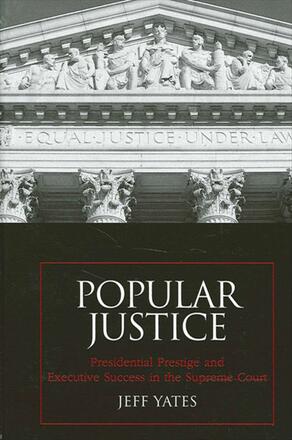
Popular Justice
Presidential Prestige and Executive Success in the Supreme Court
Alternative formats available from:
Explores the interaction between the presidency and the U. S. Supreme Court.
Description
Popular Justice explores the interaction between the presidency and the United States Supreme Court in the modern era. It assesses the fortunes of chief executives before the Court and makes the provocative argument that success is impacted by the degree of public prestige a president experiences while in office. Three discrete situations are quantitatively examined: cases involving the president's formal constitutional and statutory powers, those involving federal administrative agencies, and those that decide substantive policy issues. Yates concludes that, while other factors do exert their own influence, presidential power with the Court does depend, to a surprising degree, on the executive's current political popularity.
Jeff Yates is Assistant Professor of Political Science at the University of Georgia.
Reviews
"Most students of judicial behavior and not a few students of presidential behavior should find this volume interesting and enlightening. " — Political Communication
"There is much to like in this book. It advances our knowledge of presidential influences on court judgments, contains useful prescriptive recommendations, and demonstrates the usefulness of quantitative analysis in examining the presidential-Supreme Court relationship. " — Stephen J. Wayne, coauthor of Presidential Leadership: Politics and Policy Making
"What I find most impressive about this book is its integration of the literature from the last twenty years on the relationship between the Court and the executive branch into a multi-variate analysis. Most of the literature has been descriptive in nature, often doctrinal, and when empirical it has been limited to descriptive statistics with little causal analysis. This book moves beyond those accounts and attempts to develop a causal model utilizing multi-variate statistical techniques. The result is an account which is both rigorous and robust. " — Reginald Sheehan, coauthor of Continuity and Change on the United States Courts of Appeals